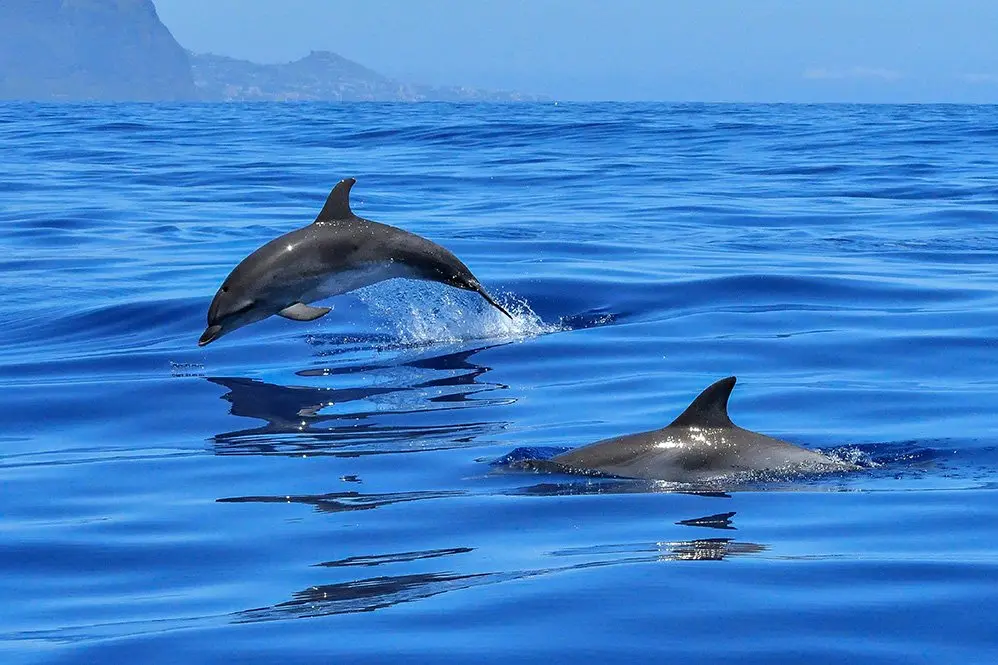
Dolphins are known for their remarkable intelligence, social behavior, and unique abilities. These marine mammals, found in oceans and seas around the world, have captivated human hearts with their playful nature and complex social interactions. In this article, we will dive deep into the latest news about dolphins, exploring their behaviors, conservation challenges, and the importance of protecting these incredible creatures.
Dolphins: Understanding Their Intelligence and Social Behavior
Dolphins belong to the family Delphinidae, which includes over 40 species. They are highly intelligent animals capable of complex social behaviors, communication, and problem-solving. Dolphins use a sophisticated system of vocalizations, including clicks, whistles, and body language, to communicate with one another and navigate the waters.
Dolphins’ Social Structure and Behavior
Dolphins are highly social creatures. They typically live in groups called pods, which can range from a few individuals to hundreds. These pods are essential for protection, hunting, and social interaction. Within the pods, dolphins establish complex social hierarchies, with each individual playing a specific role.
They also demonstrate remarkable cooperation, such as when hunting for food. Some species of dolphins engage in cooperative hunting strategies, working together to herd fish into tight groups, making them easier to catch.
How Dolphins Communicate: A Deep Dive into Their Vocalizations
One of the most fascinating aspects of dolphins is their communication system. Dolphins communicate using a wide range of vocalizations, including whistles, clicks, and chirps. Each dolphin has its own signature whistle, similar to a name, which helps them identify each other within the pod.
Additionally, dolphins use body language, such as leaping, tail slapping, and fin waving, to convey emotions and intentions. Their ability to communicate with such complexity is a testament to their intelligence.
Dolphins and Their Role in the Marine Ecosystem
Dolphins play an important role in maintaining the health of marine ecosystems. They help regulate fish populations by preying on them, contributing to the balance of the food web. Dolphins also help maintain the health of coral reefs and other marine environments by controlling the populations of certain species.
Dolphins as Apex Predators
As apex predators, dolphins are at the top of the food chain in many marine ecosystems. Their diet mainly consists of fish, squid, and other marine creatures. However, their hunting tactics vary by species, and some dolphins even collaborate with other species in their hunting endeavors, showcasing a remarkable degree of adaptability.
For instance, certain dolphin species in the Pacific Ocean have been observed working with humans to catch fish, a practice that has existed for thousands of years. This symbiotic relationship demonstrates the intelligence of dolphins and their ability to form partnerships across species.
The Importance of Protecting Dolphins
Dolphins face a variety of threats, including habitat loss, pollution, and fishing industry bycatch. Pollution, particularly plastic waste, has become a major concern for marine life, including dolphins, who may ingest or become entangled in debris.
Efforts to protect dolphins are crucial not only for the species’ survival but also for the preservation of marine ecosystems. Conservation organizations around the world are working to raise awareness about these issues and develop strategies to safeguard dolphins and other marine life.
Latest News on Dolphins: Exciting Discoveries and Developments
Recent research and developments in marine biology have shed new light on dolphin behavior and conservation efforts. Researchers have discovered new ways dolphins use tools, with some species now known to use marine sponges to protect their snouts while foraging on the ocean floor.
Dolphins’ Incredible Use of Tools
In recent years, scientists have uncovered evidence that certain dolphin species use tools in their daily activities. One notable example is the use of marine sponges by bottlenose dolphins to protect their sensitive snouts while searching for food on the ocean floor. This behavior, observed in Australia, marks an exciting discovery in understanding the cognitive capabilities of dolphins.
Conservation Efforts for Dolphins: Challenges and Solutions
Conservationists continue to work tirelessly to ensure the survival of dolphins. The International Whaling Commission (IWC) and other organizations have implemented measures to protect dolphins from hunting, bycatch, and habitat destruction. However, challenges remain as pollution and climate change continue to threaten marine environments.
How Human Activities Affect Dolphin Populations
Human activity has had both positive and negative impacts on dolphin populations. While some human-dolphin interactions have been beneficial, others have led to detrimental consequences for these intelligent creatures.
The Threat of Bycatch in Fishing Nets
One of the greatest threats to dolphins comes from fishing practices. Dolphins often get caught in fishing nets, a phenomenon known as bycatch, which can lead to injury or death. Efforts are ongoing to develop dolphin-friendly fishing gear, and many countries are enacting laws to limit the capture of dolphins in fishing operations.
Pollution and Its Impact on Dolphins
Pollution, particularly plastic waste, is another major threat to dolphins. Plastic debris in the ocean can be ingested by dolphins or cause entanglement. This highlights the importance of reducing plastic pollution and promoting cleaner oceans.
Human-Dolphin Interactions: A Delicate Balance
In some regions, humans have formed unique relationships with dolphins. In certain coastal areas, dolphins have been known to assist fishermen in catching fish, while in other regions, they have been trained to perform tricks for human entertainment. While these interactions can benefit both dolphins and humans, they must be managed carefully to ensure the well-being of the animals.
What Can We Do to Help Protect Dolphins?
As individuals, there are several actions we can take to help protect dolphins and support conservation efforts. One of the most important steps is reducing our environmental impact, particularly by cutting down on plastic waste and supporting clean-up efforts in marine environments.
Supporting Dolphin Conservation Organizations
Many organizations are dedicated to protecting dolphins and other marine creatures. Supporting these organizations through donations, spreading awareness, and volunteering can make a big difference in the fight to protect dolphins.
Making Responsible Consumer Choices
As consumers, we can make responsible choices when it comes to products that may impact marine life. For example, choosing sustainably sourced seafood and reducing plastic consumption can help protect dolphins and other ocean-dwelling creatures.
Conclusion: Protecting Dolphins for Future Generations
Dolphins are incredible creatures that have captivated human imagination for centuries. Their intelligence, social behavior, and role in marine ecosystems make them essential to the health of our oceans. However, dolphins face numerous threats that put their populations at risk. By supporting conservation efforts and making responsible choices, we can help ensure that future generations will continue to enjoy the wonders of dolphins.
External Links to Relevant Resources:
- WWF – Dolphins
- Explore WWF’s efforts in dolphin conservation and the various species they are working to protect.
- WWF Dolphin Conservation
- National Oceanic and Atmospheric Administration (NOAA) – Marine Mammals
- NOAA provides detailed information on marine mammals, including dolphins, and how they are impacted by environmental changes.
- NOAA Marine Mammals
- Marine Conservation Society – Dolphins
- Learn more about protecting dolphins and their habitats with the Marine Conservation Society.
- Marine Conservation Society – Dolphins
- International Whaling Commission (IWC) – Dolphin Conservation
- The IWC is actively involved in the protection of dolphins and other marine species.
- IWC Dolphin Conservation









Leave a Reply